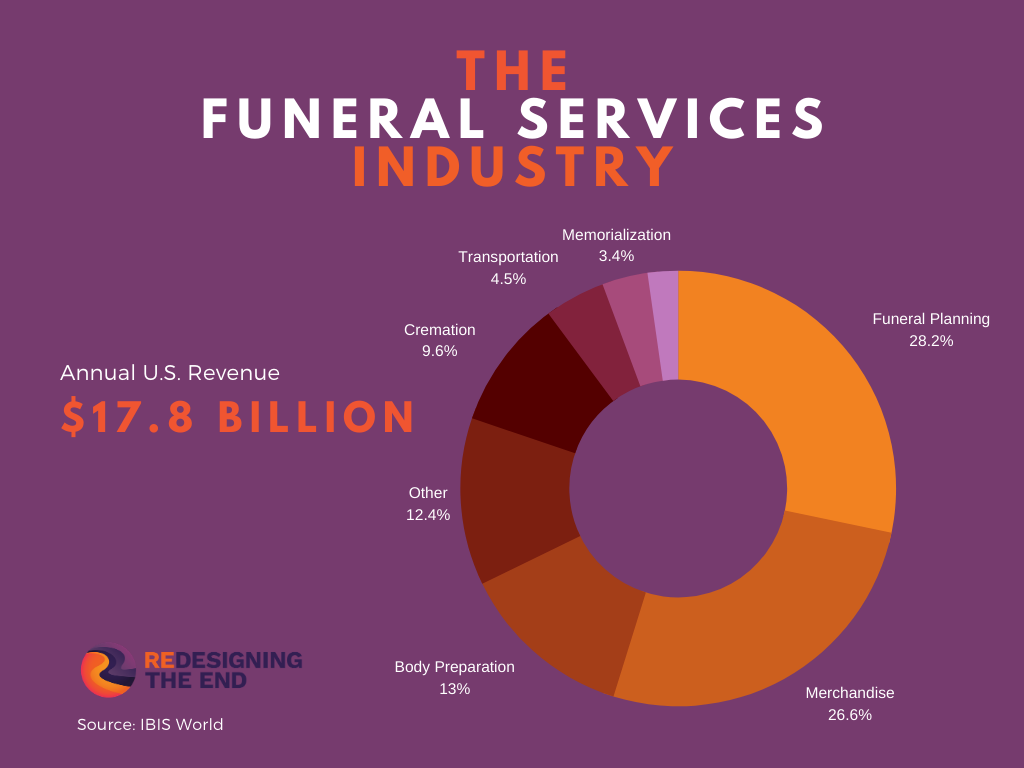Dying is expensive and bad for the environment.
But faith communities, funeral directors, policymakers, and entrepreneurs have an opportunity to reshape the $17.8 Billion funeral industry by capitalizing on two major changes in consumer behavior: the rise of virtual funeral services, and the return to green burials.
If you have an interest in going deeper on these topics, read on and register for these upcoming free events: Opportunities in Green Burial & How to Host a Virtual Funeral.
Follow the Money
To understand how the industry works, it’s important to understand the economics. Here are the top five sources of revenue for the funeral services industry:
- Funeral Planning Services – $5.0 Billion
- Resale of merchandise – $4.7 Billion
- Body preparation and internment – $2.3 Billion
- Other – $2.2 Billion
- Cremation – $1.7 Billion
For contemporary providers, merchandise like caskets and urns are a crucial source of revenue. But than’s also a huge source of friction and irritation for consumers. Selling to grieving families has always been problematic – see Jessica Mitford’s “The American Way of Death” – and salespeople notoriously burn out fast in this industry.
Embalming was once thought to stop the spread of disease, a claim that isn’t true. As funeral services and memorialization evolve, consumer preferences are changing. Cremation is on the rise (54% on the way to 60% in 2024) and embalming is on the way out.
Climate awareness is one factor changing consumer preferences. And what was once taken for granted – all the merchandise and chemicals – is now seen as putting unnecessary distance between the body and the family.
Claire Callendar, a green burial provider, says, “People are hungry to talk about death and to get involved in it, yet high-street funeral directors totally miss this. They have this barrier between themselves and the people, they wear those ridiculous suits and they’re all about upselling. It’s a faux-Victoriana of ‘dignity’ and ‘respect’ – schooling you in the etiquette of bereavement.”
So here are the two biggest opportunities we see to lower the cost and improve the way consumers interact with the funeral industry.
Opportunity #1: The Rise of Virtual Funeral Services
Every part of human life has been impacted by COVID, and one of the themes has been the accelerated adoption of technology. Every kid is using Zoom, e-commerce is devouring retail, and telemedicine is exploding. The same is true for the funeral business.
Demand for virtual funeral planners is off the charts. It’s really hard to find somebody who’s comfortable with death, skilled with technology, and personable enough to navigate complicated family dynamics in an emotional time. But if you’ve got this mix of skills then you’ve got no problem finding work. Hybrid funerals will become the norm, even as the risk of in-person gathering goes away.
We’re hosting a free webinar to show you how to host a virtual funeral service.
Opportunity #2: The Return to Green Burials
Green burial isn’t new. It’s the way people were buried for most of human history and you can see evidence of this in religious tradition. Christians, Jews, Muslims and others have provided hands-on green burial services to their communities for centuries. It’s only been the past fifty years in the U.S. that fell out of fashion.
As faith communities look for ways to add value in our increasingly secular society, many are reclaiming role in the funeral services indusry. Their role is crucial because state laws make it really hard for companies to create new burial grounds of any kind. In an effort to protect consumers, laws have stifled innovation and competition. That’s why faith communities, schools, and municipalities play such a crucial role in serving increased demand for natural burial.
Conservation burial is a low cost burial that uses sustainable cemetery management practices while restoring and protecting the ecological integrity of the land. It’s also legal to compost bodies in Washington. Companies like Recompose off you the option to become soil when you die – a service they’ve launched this year.
If you’re interested in learning more about opportunities in green burial from some of the experts in this growing movement. Register for our upcoming free webinar: “Opportunities in Green Burial“.



